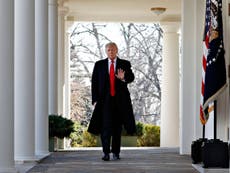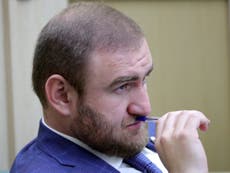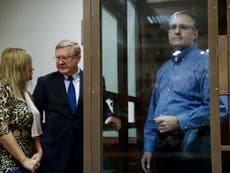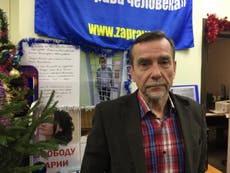How Putin will fight back as his Russian political monopoly shows the strain
Democracy in Russia is supposed to legitimise the ruling elite, at most test it
In the mid-1990s the Japanese embassy in Moscow received a request from Russian MPs supporting the then president Boris Yeltsin. They asked the staffers to prepare a report on how the ruling party in Japan had clung to power for decades despite holding free elections. To those MPs, enthusiastic about liberal reforms yet lacking a majority to deliver on them, combining democracy with a one-party system was an alluring option.
Alas, the Russian regime learned only half the lesson. The Kremlin-backed party gained dominance, but only at the expense of electoral freedoms. Yeltsin’s successor, Vladimir Putin, tied economic and political resources to the center, impeding the private sector’s ability to hold sway over electoral campaigns.
Free elections, Putin feared, risked paving the way for populism and the disintegration of a country with strong authoritarian traditions, widespread poverty, and a weak middle class.
Democracy in Russia is supposed to legitimise the ruling elite, at most test it. Since 2001, the president and the United Russia party have had little trouble beating their handpicked sparring partners.
But that political monopoly is now showing cracks, as Russia scrambles to find money for new infrastructure and the replenishment of financial reserves. Since last summer the government has increased VAT, raised the pension age, and slapped new taxes on the self-employed.
The hike in the retirement age proved particularly toxic. Following the reform, the government, the United Russia party and even the presidency saw their approval ratings collapse to the lowest level since 2011-13, when Russia had its largest protests since the fall of the USSR.
It’s not just the polls. Last autumn United Russia candidates suffered setbacks at the local elections held in a third of the country’s regions. The ruling party lost four governor races to candidates from the left-wing Communist Party and the nationalist Liberal Democratic Party (LDPR). Both act as nominal opposition yet demonstrate loyalty to Putin, who is officially an independent but maintains links to the United Russia.
But while voters back the Communists or LDPR to punish United Russia, many of them don’t see those parties as trustworthy mediators. Some 42% of Russians say no party speaks for their interests; 41% declared their wish for a new socialist party. More than a half opted for establishing a new centrist (28%) or a liberal (34%) party.
That causes headaches for the presidential administration, an executive body which oversees the Kremlin’s political operations. Next autumn Russians will elect new governors and lawmakers to regional parliaments. In 2021 the country will hold federal parliamentary elections, one last time before Putin’s mandate ends in 2024.
So how will the Kremlin try to address these growing public concerns?
One proposal, from Constitutional Court Chairman Valery Zorkin, calls for a genuine two-party system in Russia to give people real choice. To do so, Russia would introduce a majoritarian electoral system (in place of a mixed one) and strengthen parties on the left-wing flank.
Others invoke cruder solutions for the Kremlin. The instigation of mass vote fraud perhaps, or the doubling down on political repression.
It is unlikely we will see any major change. Attempts to artificially cultivate a two-party system have failed in the past. The Kremlin toyed with the idea in late 2000s, when it supported a new Just Russia party. The plan was to turn it into a social democratic competitor to United Russia (while being loyal to Putin). However, the new party became a distraction to the regime with its rebellious MPs, while failing to win credibility in the eyes of protest-minded voters.
More hints at the Kremlin’s reticence came during Putin’s speech to the United Russia conference in December. Putin praised the party’s achievements, calling on it to unite behind his economic agenda. Political consolidation is as important as ever – only this time not to protect against the West, but to support the president’s infrastructure programme.
Nor is the Kremlin prepared to ramp up repression or suppress elections. Putin’s approval ratings have dipped, but remain pretty healthy by the standards of some western democracies. Living standards in big cities remain decent; protests lack coordination. Selective repression against protest instigators in key cities – together with propaganda – will likely be the regime’s preferred tools to head off public unrest.
But that’s not to say nothing will change.
First, communication will be revised. The need to do so was rammed home by Putin in his December speech, which followed several high-profile gaffes where United Russia members made derisory comments about the poor.
Second, the process of selecting Kremlin-backed candidates for elections and executive posts will become more rigorous. And finally, the Kremlin will try to overcome Russians’ apathy and raise turnout at the next parliamentary election.
The Communists and LDPR may undergo rebranding, as their leaders are already in their seventies and have lost their appeal even as sparring partners. At the same time, those parties shouldn’t be allowed to grow too powerful. For that purpose, the Kremlin is mulling encouraging more smaller parties to run in the upcoming polls to split the protest electorate.
In short, the Kremlin believes its current issues are down to temporary factors: tough reforms at the start of the political cycle, communication issues, and a lack of new cadres.
It may not be wrong. Putin’s demise has been forecast dozens of times over the last decade, all mistakenly. And there is little to suggest that his regime faces an immediate threat. The likelihood is that Putin can pull off the power transition in 2024 without major hurdles, ramping up public spending to cushion a path for his successor.
That leaves some long-term risks hanging over the regime. Putin’s coalition was built on the back of record high oil prices and geopolitical feats which no longer come with a guarantee. The elites will have to think strategically how to manage this new reality. It will fear it can no longer rely on a deferential electorate – but still doesn’t know quite know what new reality it wants to create.
Evgeny Pudovkin is a Moscow-based journalist and staff writer at Russian business daily RBC






Join our commenting forum
Join thought-provoking conversations, follow other Independent readers and see their replies